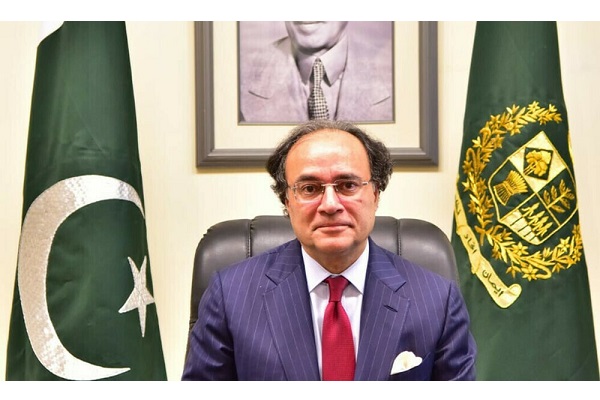KARACHI: Pakistan Stock Exchange above the 98,000 mark on Friday as share prices surged more than 2,000 points in intraday trade
ISLAMABAD: Newly appointed Finance Minister Muhammad Aurangzeb previously employer of Habib Bank Limited (HBL) formally announced the resignation of its erstwhile president and CEO on Monday. According to a press release, he will be succeeded by Chief Operating Officer Mohammad Nassir Salim, subject to the approval of the State Bank.
HBL Chairman Sultan Ali Allana noted that Mr Aurangzeb was embarking “on a new chapter of service to the nation, underscoring a commitment to national responsibility.”
Appreciating his service to HBL, Mr Allana expressed the confidence that he would contribute to the economic and financial development of Pakistan as finance minister.
“As I embark on this new chapter, I carry with me the valuable lessons and experiences gained at HBL. I am excited about the opportunity to serve our country in this new capacity and contribute to the economic growth and development of Pakistan”, the statement quoted Mr Aurangzeb as saying.
Muhammad Aurangzeb soon after being sworn in at a ceremony held at the Presidency on Monday, said “No debates, no waste of time — just a steadfast commitment to implementation”.
His appointment was the highlight of the oath-taking ceremony, which drew a large audience. Several of those in attendance were heard discussing the appointment of the career banker as the new finance czar — a departure for the PML-N, which has traditionally persisted with Sharif family confidant Ishaq Dar at the helm on at least four occasions.
In a brief but frank conversation, Mr Aurangzeb expressed his commitment to implementing all policies put into place by the caretaker government.
“I must commend the policy measures of the caretaker government, which have helped improve economic indicators,” he stated.
He said that Pakistan would persist in its discussions with Fund officials to secure the release of the final tranche of the soon-to-expire $3 billion loan package. He attributed the successful negotiation of this deal to Prime Minister Shehbaz Sharif, who secured it during his 16-month tenure at the helm of the previous Pakistan Democratic Movement (PDM) government.
“Had this deal not been secured, the current economic landscape would have been markedly different,” he noted.
On the need for a new agreement with the IMF, Mr Aurangzeb revealed that his team was poised to commence discussions for a fresh three-year arrangement to secure a substantial loan, with a minimum value of $6 billion.
“The exact amount of the package is yet to be determined,” he said, emphasising that there will be no delay in initiating talks for this new agreement with the IMF.
Mr Aurangzeb also stressed the need for a clear and decisive plan for privatisation, as per the prime minister’s instructions.
“We are left with no choice but to execute a robust privatisation plan,” he asserted, emphasising that this was the only viable strategy to create some fiscal space.
The minister assured that his economic team will take measures not only to minimise government expenditures, but also enhance revenue collection.
When quizzed about inflation, the minister asserted that the deployment of effective policy measures is expected to alleviate inflationary pressures in the economy,
To another question, he said that new faces will be appointed to part of his finance team. However, he did not disclose their names.
Talking about the Federal Board of Revenue — the country’s tax authority — the minister admitted his unfamiliarity with the reform measures taken by the caretaker government. “I have not been briefed on it,” he said, but was quick to add that any reforms should ultimately lead to an increase in revenue collection.
He also praised the Special Investment Facilitation Council (SIFC), expressing confidence that it would aid in the implementation of economic policies.
On the exchange and policy rates, Mr Aurangzeb acknowledged that while these matters primarily fell under the purview of the State Bank of Pakistan, there was no restriction on engaging in discussions with the central bank on these vital economic indicators.
Drawing a parallel with the US, where the Treasury and Federal Reserve, despite having different mandates, engage in dialogue as part of economic policy formulation, he suggested that a similar approach could be adopted between the finance ministry and the State Bank in their respective domains.
“I foresee more stability in the exchange rate due to the steady improvement in economic indicators,” he said, and expressed optimism about an improvement in the policy rate in the coming months.
You May Also Like
TEHRAN: The head of Iran’s Revolutionary Guards described the arrest warrant issued by the International Criminal Court for Israeli Prime
LOWER KURRAM: The death toll in yesterday’s gun attack on passenger vans in Khyber Pakhtunkhwa’s Lower Kurram has risen to 42,






